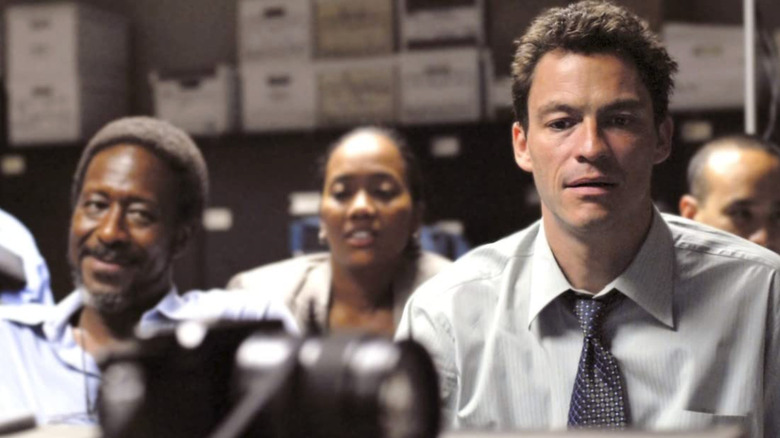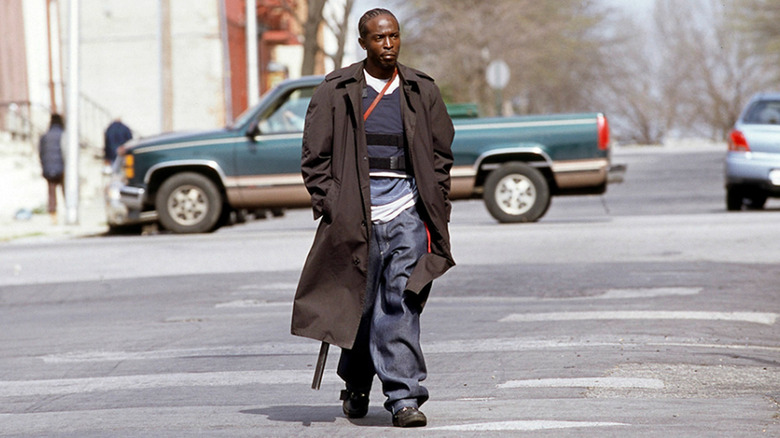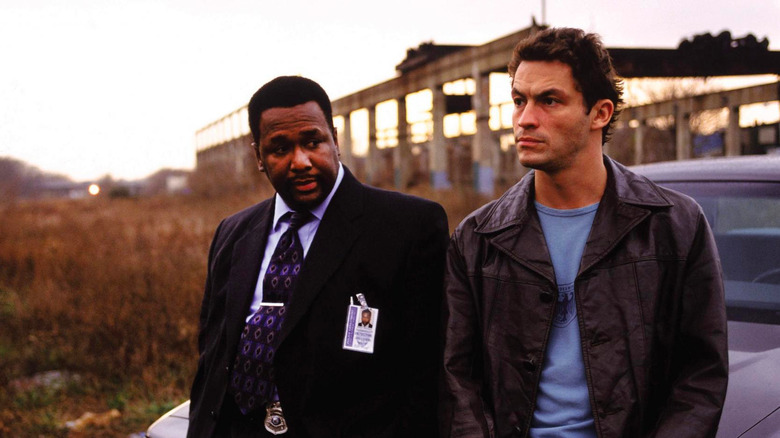The Wire Might Not Have The Same Writers' Room If It Were Made Today
It's hard to believe that it's been 20 years since "The Wire" first premiered on HBO. The series was part of the first wave of prestige TV as we know it today, laying the groundwork for HBO's present-day cornerstones like "Game of Thrones." Ironically — and despite greenlighting the series in 2002 — HBO didn't fully understand the vision of "The Wire" for quite some time. It was a complicated show, one that took more influence from Greek tragedies and 19th century novels than, say, the serialized dramas that have dominated primetime TV for decades. And it was constantly courting cancellation — at least, before finally gaining a small (yet loyal) fanbase.
There are a lot of reasons why something like "The Wire" might not work today. The nature of television has changed so drastically in 20 years, though the themes within "The Wire" are just as prevalent now, if not more so. Still, creators David Simon and Ed Burns are skeptical that their thoughtful, Dickensian condemnation of the drug war would fare well on HBO these days. It has a lot to do with the prevalence of audience-grabbers like "Game of Thrones," but ironically, diversity plays a big part in it, too.
The Wire required a more diverse perspective behind the scenes...
Whether you're looking in front of the camera or behind it, HBO series haven't always had the best track record when it comes to diversity. The network has gotten plenty of flack for the homogeny in some of their most popular series, but David Simon argues that their approach to diversity on "The Wire" would have hurt the series if it were made today. "We didn't attend, in any real way, to the idea of diversity in the writers' room," Simon told The New York Times. Neither he nor Burns were overly concerned with seeking out writers of color for the show, despite the fact that a bulk of the characters in "The Wire" were people of color.
"I tried to get Dave Mills, who had been my friend since college, to work on 'The Wire,'" Simon added. "But that would have been organic. It was just a friend; it wasn't even about Black and white."
Simon has frequently described "The Wire" as "a novel," just on television. As such, the creators often hired novelists to write for the show instead of screenwriters. Simon and Burns were looking for writers who had covered, or even experienced, the same issues that the show explored. Ironically, that rarely included writers who also happened to be Black.
Apart from David Mills and playwright Kia Corthron, there weren't many Black voices in the writers' room — which is honestly a bit baffling, even by the standards of the early aughts. Baltimore, where "The Wire" takes place, has been majority-Black for decades. Would it really have been that hard to find a Black novelist in the area who shared their expertise?
...Or did it?
"If I had it to do over again, I would have to look at [the diversity of the creative team] in the same way that I looked at later productions," Simon added. And while he certainly might have felt pressure from critics and activists, I'm not entirely sure the network itself would set the same expectation. There's a lot of multicultural content on HBO, but not all of it is safe from cancellation. "The Gordita Chronicles," a refreshingly-inclusive series executive produced and directed by Eva Longoria, is just the latest to get the boot (in spite of its positive reception!). And of course, there's now the issue of the Batgirl in the room. So while it'd be nice for "The Wire" to boast a more diverse writers' room, would that have ever been a requirement to get the greenlight on the platform? And how would it have changed the stories told across the series' five seasons? These are the questions we're left to ponder 20 years after the fact.


